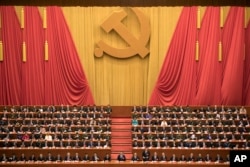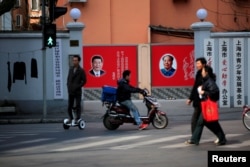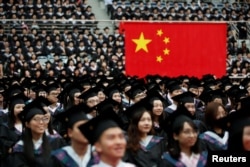More than 20 universities in China have set up research centers to promote the so-called Xi Jinping thought — the vision of the country's increasingly powerful leader that was recently enshrined in the Communist Party's constitution.
The push to study “Xi Thought” has some academic institutions competing for resources and aiming to be the first to elaborate on the top leader’s ideas of governance.
But some analysts worried the move is aimed at strengthening political control on campus.
“This is not education at all. It is a brazen attempt to impose political control,” said Perry Link, a China scholar at the University of California Riverside, in an emailed reply to a VOA query.
Political control?
At the end of the Communist Party’s 19th national congress last week, party delegates voted unanimously to make "Xi Jinping Thought on Socialism with Chinese Characteristics for a New Era" a guiding principle for the party.
Xi Thought was derived from his three and a-half hour report, delivered at the opening of the high-level twice-a-decade meetings on October 18, and has touched upon his ideas of government, governance, and roadmap for the country’s development in the next five decades.
The move has instantly elevated the 64-year-old leader’s political stature, putting him on par with Mao Zedong, the communist revolutionary who proclaimed the People's Republic of China and whose political theory — known as Maoism — has long been taught in Chinese schools.
Right after Xi’s elevation, Beijing’s Renmin University took the initiative in tasking top scholars to set up a research center to study the current leader's political theory.
Instilling 'Xi Thought'
According to the official Communist Party newspaper Beijing Daily, the institute will help universities nationwide to incorporate Xi Thought into students’ textbooks and their “minds.”
Within a week, more than 20 universities, including Yunnan University, Tianjin Normal University and Hebei University, followed suit to create similar research centers, while study groups have been organized nationwide.
While saying Xi Thought is not as developed, written about, nor historically entrenched as that of Mao or even the notorious Gang of Four, David Zweig, chair professor of Hong Kong University of Science and Technology’s social science division, said the academics’ push to study Xi’s political vision is common and to be expected in China.
Zweig is not surprised that the country’s universities will compete for budgets — and for being first to elaborate Xi’s ideas of governance.
A rush to comply
“Right now, I think there’s still a lot up in the air in terms of defining what is the core issue in Xi Jinping Thought. So, universities will be competing to a certain extent to be the one who can make major contribution to this,” Zweig said.
“You know, people bandwagon, people rally, the party mobilizes. That’s quite common,” the professor added.
Zweig expects Xi Thought to be added into the existing curricula of university students, who will probably be asked to show a high level of loyalty and to memorize the top leader’s key concepts.
Room for reflection on errors?
“When you get a very powerful single leader, there are concerns about mistakes. So, you’d like to see Xi Jinping Thought somehow open up to reflections on policies and policy errors and good governance and things like that,” he said.
But Tiananmen Square dissident Wu’er Kaixi is not as optimistic, saying China is moving in a wrong and dangerous direction with Xi’s authoritarian rule and his ambition to influence other countries.
He added Xi’s plan to impose political control on campus reaches a new level, "but is nothing new as the party’s propaganda efforts have been systemic.”
However, the general public’s response to the study of Xi Thought has been tepid.
Public response is tepid
On Sina Weibo, China’s Twitter-like microblogging platform, netizens had almost nothing to say about news stories online about the universities’ efforts to study Xi Thought.
One Weibo user wrote Xi Thought “is an innovative adjustment to a super power country’s strategic thinking and has embodied the nature of Marxism, which is to advance with the times.”
Another user responded, “we the work force hates these kind of brainwashing articles.”
But college students who VOA spoke with in Beijing, on the other hand, said the issue has nothing to do with brainwashing.
One graduate student who only gave his first name, David, said that while in the West the emphasis is on individuality, “we [Chinese] mostly accept collectivism."
"This doesn't mean we don't ask why? We also ask why," he said.
But, he added, "we’re willing to sacrifice our personal freedoms, including those with respect to ideology. That is, we’re fine with top-down ideas in exchange for the country’s unity and a relatively strong enforcement.”
“In our current curriculum on politics, incumbent political policies are already included. So, to get to know a little bit more about the country’s new policies isn’t so bad. I find it necessary, not useless,” said Zhang, an environmental economics student.
A professor with the Chinese Academy of Government that VOA tried to interview, however, declined to comment on the sensitive topic.










